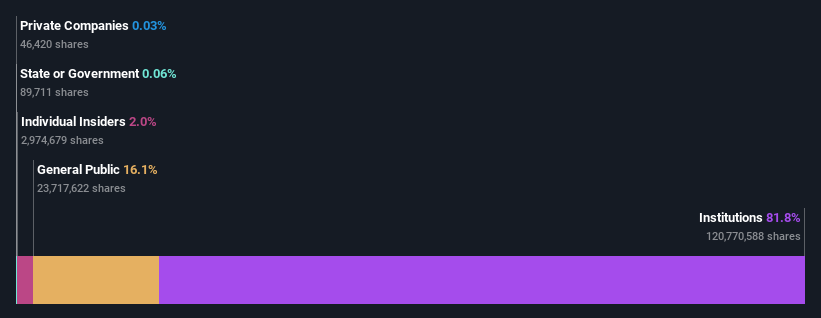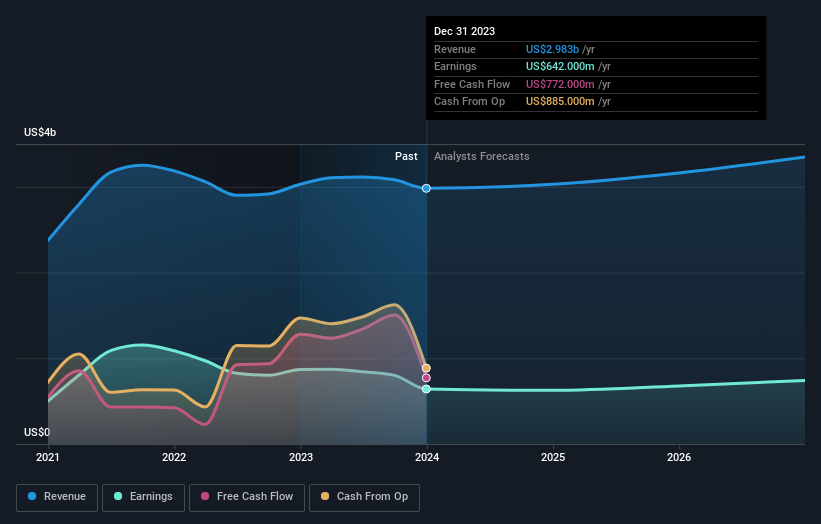Institutional owners may ignore Zions Bancorporation, National Association's (NASDAQ:ZION) recent US$298m market cap decline as longer-term profits stay in the green
Key Insights
Given the large stake in the stock by institutions, Zions Bancorporation National Association's stock price might be vulnerable to their trading decisions
The top 12 shareholders own 50% of the company
To get a sense of who is truly in control of Zions Bancorporation, National Association (NASDAQ:ZION), it is important to understand the ownership structure of the business. With 82% stake, institutions possess the maximum shares in the company. Put another way, the group faces the maximum upside potential (or downside risk).
Institutional investors was the group most impacted after the company's market cap fell to US$5.8b last week. However, the 33% one-year return to shareholders might have softened the blow. They should, however, be mindful of further losses in the future.
In the chart below, we zoom in on the different ownership groups of Zions Bancorporation National Association.
View our latest analysis for Zions Bancorporation National Association
What Does The Institutional Ownership Tell Us About Zions Bancorporation National Association?
Institutional investors commonly compare their own returns to the returns of a commonly followed index. So they generally do consider buying larger companies that are included in the relevant benchmark index.
As you can see, institutional investors have a fair amount of stake in Zions Bancorporation National Association. This implies the analysts working for those institutions have looked at the stock and they like it. But just like anyone else, they could be wrong. When multiple institutions own a stock, there's always a risk that they are in a 'crowded trade'. When such a trade goes wrong, multiple parties may compete to sell stock fast. This risk is higher in a company without a history of growth. You can see Zions Bancorporation National Association's historic earnings and revenue below, but keep in mind there's always more to the story.
Since institutional investors own more than half the issued stock, the board will likely have to pay attention to their preferences. Zions Bancorporation National Association is not owned by hedge funds. The company's largest shareholder is The Vanguard Group, Inc., with ownership of 13%. State Street Global Advisors, Inc. is the second largest shareholder owning 8.8% of common stock, and BlackRock, Inc. holds about 6.6% of the company stock.
Looking at the shareholder registry, we can see that 50% of the ownership is controlled by the top 12 shareholders, meaning that no single shareholder has a majority interest in the ownership.
While studying institutional ownership for a company can add value to your research, it is also a good practice to research analyst recommendations to get a deeper understand of a stock's expected performance. Quite a few analysts cover the stock, so you could look into forecast growth quite easily.
Insider Ownership Of Zions Bancorporation National Association
The definition of an insider can differ slightly between different countries, but members of the board of directors always count. The company management answer to the board and the latter should represent the interests of shareholders. Notably, sometimes top-level managers are on the board themselves.
Insider ownership is positive when it signals leadership are thinking like the true owners of the company. However, high insider ownership can also give immense power to a small group within the company. This can be negative in some circumstances.
Our most recent data indicates that insiders own some shares in Zions Bancorporation, National Association. This is a big company, so it is good to see this level of alignment. Insiders own US$117m worth of shares (at current prices). If you would like to explore the question of insider alignment, you can click here to see if insiders have been buying or selling.
General Public Ownership
With a 16% ownership, the general public, mostly comprising of individual investors, have some degree of sway over Zions Bancorporation National Association. While this size of ownership may not be enough to sway a policy decision in their favour, they can still make a collective impact on company policies.
Next Steps:
I find it very interesting to look at who exactly owns a company. But to truly gain insight, we need to consider other information, too. Case in point: We've spotted 1 warning sign for Zions Bancorporation National Association you should be aware of.
But ultimately it is the future, not the past, that will determine how well the owners of this business will do. Therefore we think it advisable to take a look at this free report showing whether analysts are predicting a brighter future.
NB: Figures in this article are calculated using data from the last twelve months, which refer to the 12-month period ending on the last date of the month the financial statement is dated. This may not be consistent with full year annual report figures.
Have feedback on this article? Concerned about the content? Get in touch with us directly. Alternatively, email editorial-team (at) simplywallst.com.
This article by Simply Wall St is general in nature. We provide commentary based on historical data and analyst forecasts only using an unbiased methodology and our articles are not intended to be financial advice. It does not constitute a recommendation to buy or sell any stock, and does not take account of your objectives, or your financial situation. We aim to bring you long-term focused analysis driven by fundamental data. Note that our analysis may not factor in the latest price-sensitive company announcements or qualitative material. Simply Wall St has no position in any stocks mentioned.

 Yahoo Finance
Yahoo Finance 

